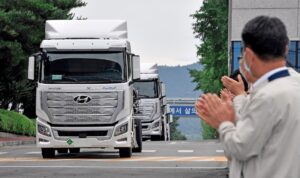The first 10 fuel cell electric trucks set to revolutionise the green hydrogen mobility ecosystem in Switzerland have been shipped from South Korea.
Hyundai Motor Company on Sunday said the first 10 Hyundai XCIENT Fuel Cells, the world’s first mass-produced fuel cell heavy-duty truck, were on their way to Switzerland.
South Korea’s largest automaker plans to ship a total of 50 XCIENT Fuel Cells to Switzerland this year, with handover to commercial fleet customers starting in September.
Hyundai plans to roll out a total of 1,600 XCIENT Fuel Cell trucks by 2025, reflecting the company’s environmental commitment and technological prowess as it works toward reducing carbon emissions through zero emission solutions.
“XCIENT Fuel Cell is a present-day reality, not as a mere future drawing board project. By putting this groundbreaking vehicle on the road now, Hyundai marks a significant milestone in the history of commercial vehicles and the development of hydrogen society,” said In Cheol Lee, Executive Vice-President and Head of Commercial Vehicle Division at Hyundai.
“Building a comprehensive hydrogen ecosystem, where critical transportation needs are met by vehicles like XCIENT Fuel Cell, will lead to a paradigm shift that removes automobile emissions from the environmental equation.”
“Having introduced the world’s first mass-produced fuel-cell electric passenger vehicle, the ix35, and the second-generation fuel cell electric vehicle, the NEXO, Hyundai is now leveraging decades of experience, world-leading fuel-cell technology, and mass-production capability to advance hydrogen in the commercial vehicle sector with the XCIENT Fuel Cell,” he added.
XCIENT Fuel Cell
XCIENT is powered by a 190 kW hydrogen fuel cell system with dual 95 kW fuel cell stacks. Seven large hydrogen tanks offer a combined storage capacity of around 32.09kg of hydrogen.
The driving range per charge for XCIENT Fuel Cell is about 400km, which was developed with an optimal balance between the specific requirements from the potential commercial fleet customers and the charging infrastructure in Switzerland.
Refuelling time for each truck takes approximately 8~20 minutes.
Fuel cell technology is particularly well-suited to commercial shipping and logistics due to long ranges and short refuelling times.
The dual-mounted fuel cell system provides enough energy to drive the heavy-duty trucks up and down the mountainous terrain in the region.
Green Hydrogen Ecosystem
In 2019, Hyundai formed Hyundai Hydrogen Mobility (HHM), a joint venture with Swiss company H2 Energy, which will lease the trucks to commercial truck operators on a pay-per-use basis, meaning there is no initial investment for the commercial fleet customers.
Hyundai said it chose Switzerland as the starting point for its business venture for various reasons, one being the Swiss LSVA road tax on commercial vehicles, which does not apply for zero emission trucks.
That nearly equalises the hauling costs per kilometre of the fuel cell truck compared to a regular diesel truck.
Hyundai’s business case involves using purely clean hydrogen generated from hydropower. To truly reduce carbon emissions, all of the trucks need to run on only green hydrogen.
Switzerland is the country with one of the highest shares of hydropower globally, and can therefore deliver sufficient green energy for the production of hydrogen.
Once the project is underway in Switzerland, Hyundai plans to expand it to other European countries as well.

Source: www.h2-view.com